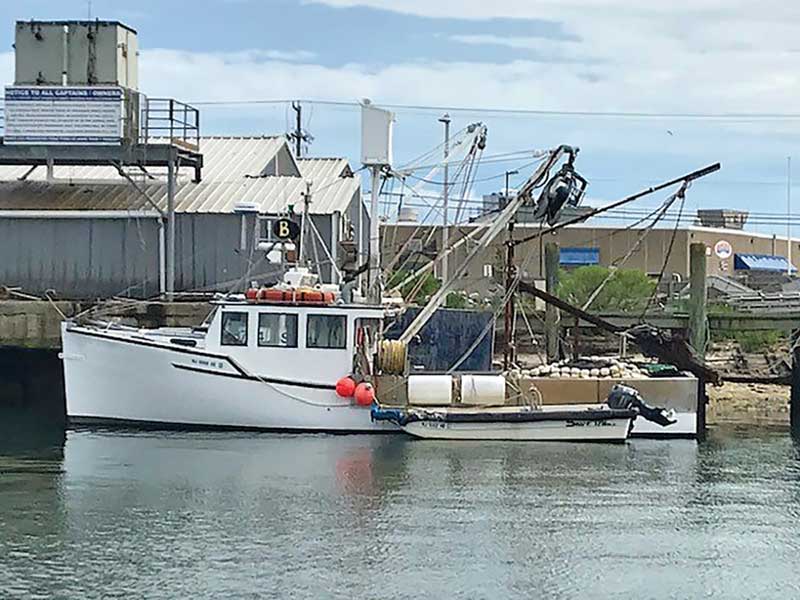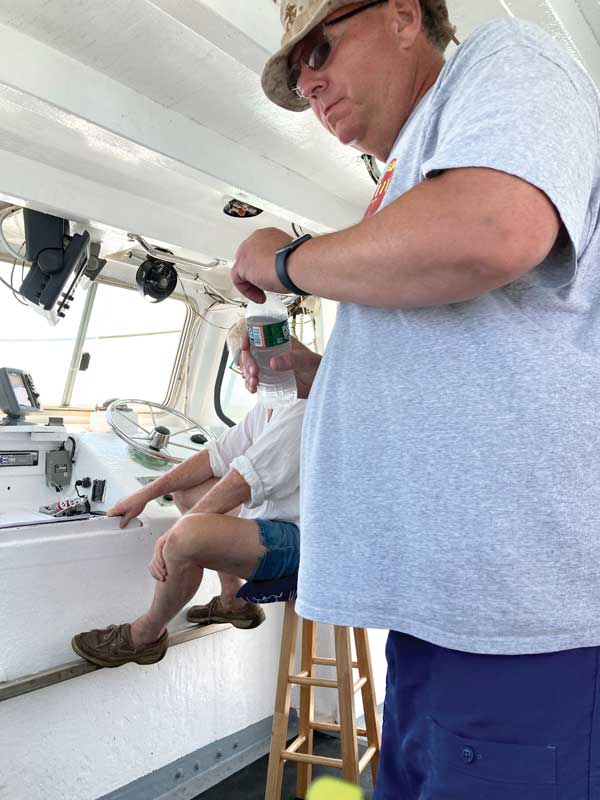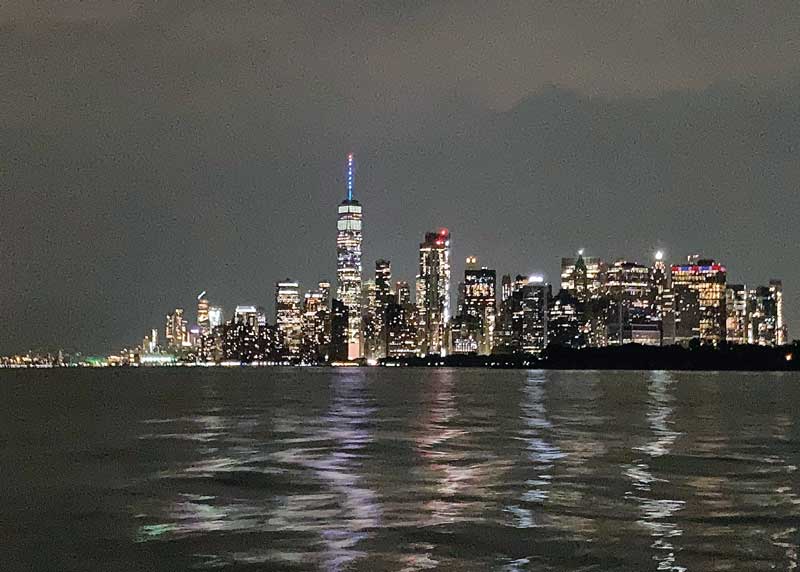I have a confession to make. This is a story about a boat delivery that didn’t turn out so well, but I must admit that I may have been partly to blame. I had ignored the advice of my old friend Ron, a Canadian Coast Guard retiree, who had once warned me against taking on deliveries of ‘dodgy’ boats, regardless of whether I needed the money or not. To do so was not only dangerous, he explained, but also because: “You’ll acquire a reputation for delivering any old piece of junk, and that’s not what you want.”

“Don’t give in to desperation,” he admonished. “If you get a reputation like that, pretty soon nobody with a decent boat will hire you.” But here I was, cooling my heels in a popular dive bar in Cape May, NJ, with my old pal Captain Tom and brother-in-law, Joe, in happy anticipation of a late-summer delivery job that meant bringing a 46-foot long commercial fishing boat—what we called a ‘Pogie boat’ actually—all the way to mid-coast Maine. That would mean a decent check, and I hadn’t had a delivery job in a couple of months. Ron’s wisdom was thus scattered to the wind.
The boat, without a name, was a ‘Novi-style’ (as in Nova Scotia) single-screw craft with a stubby, short bow, and appeared to have been lengthened by some 10 feet at the stern at some point long after its original manufacture. The aft end was sheathed in stainless steel sheet-metal. She was ugly, to be sure, and had seen better days. All I knew was that the owner, a young fellow named Bill, ran a lobster wholesale and fishing business up in Maine. He owned and operated a couple of lobster boats, and had to buy his lobster trap bait, menhaden, or as we called them pogie/pogy, from local pogy fishermen, who owned boats that were especially configured for catching pogys and not lobsters. If he could purchase a pogy fishing boat, he reasoned, he could put his own crew aboard and catch his own bait, a sensible proposition given the comparatively high cost of buying bait. He would then, he surmised, increase his overall profit.
"But to this day, since then, I will not deliver a boat unless it has checked out in every way."
Where his otherwise sensible strategy fell apart, however, was when he decided to purchase his gently used pogy boat online, or sight unseen, from a fishing cooperative in Cape May. Bill’s brother had traveled to Cape May to check out the boat, so I was told. Buying a boat without seeing it first, as I knew, often opened the door to a multitude of possible swindles, which are a common enough occurrence in the marine industry, including the commercial fishing industry. One should never purchase a used boat of any type sight-unseen. Bill was about to learn this simple but time-tested lesson the hard way.
At the fishing dock, we took on some free ice to keep our lunches and beverages cold and set out. The first thing we noticed was how terribly loud the diesel engine exhaust was, coming through a standing exhaust pipe bolted to the wheelhouse. If you stood out on the main deck behind the wheelhouse, the noise was nearly deafening. We had no galley, or stove, no working head (bucket and chuck-it), and once we were heading out past the jetties from Cape May harbor, we realized that there were no ship’s papers, and the two fire extinguishers had expired tags on them. At that point I should have turned back and scuttled the voyage.

Quite possibly the most noticeable ‘missing’ element was the complete lack of a stinky pogy odor. On the telephone, Bill’s brother told me that he had taken great pains to wash down the boat and the fish-hold because the smell was so strong, but actually, he hadn’t. There was no fish smell at all. There was some equipment on the afterdeck, but the entire boat seemed like the wrinkles in Santiago’s face in Hemingway’s The Old Man and the Sea—“erosions in a fishless desert.”
“What the heck was Bill’s brother talking about?” I commented to Tom and Joe. “This boat hasn’t fished in years! There isn’t even a fish smell.” I remember the sardonic grin on the face of the dock manager as we pulled away from the pier in Cape May. He knows something, I thought at the time.
At least there were three life jackets aboard, but no other accommodations such as mattresses in the bunks (two bunks) or pressurized water for washing.
“This boat is a dog,” Joe commented, in disgust. “The sooner we get it to its destination, the better off we’ll be.”
Our route, quite simply, ran up the East Coast of New Jersey, into New York bay and harbor, through the East River, and into Long Island Sound. From there, we would head up Buzzard’s Bay, transit the Cape Cod Canal, and once in Massachusetts Bay, we would head for Provincetown and then make a beeline for Penobscot Bay and our destination.

Our provisions for the trip consisted of a small cooler packed with sub sandwiches, bottles of water, some odds and ends, a bunch of bananas, and a bucket of Johnson’s wonderful caramel popcorn from nearby Ocean City. Then we were off, out through the jetties and headed northeast, where after an hour or so we could see the ghostly, hazy outlines of the towering hotels of Atlantic City in the distance.
I had hung the bunch of bananas, for snacking, from a peg in the wheelhouse; only later I was told that supposedly bananas hanging in the boat were ‘bad luck.’ I had never heard that before (even in the Caribbean), but without question we were visited by phenomenally bad luck later in the trip, so I suppose the prophecy must be true.
Our boat didn’t actually have a name, so we christened it Ugly Duckling, or simply “Ugly,” in part due to the way she steered through the water. She swam like a snake, unwilling to steer a straight line without constant attention, especially with a great deal of play in the steering system. But luckily, she was equipped with an autopilot system, and once Tom had tinkered with it and had learned how to make it work correctly, it did the work that would have exhausted any one of us. I’m surprised that we did not burn it out, as it was working hard, but it kept Ugly on a mostly steady course as we steamed up the coast of New Jersey. By dark we were off of Sandy Hook and headed for New York Bay.
The delivery had been uneventful up until that time, with Tom at the helm and Joe and I doing the chart work. We had an electronic chartplotter of dubious vintage, but we had been through these waters before in other boats, and essentially knew our way. We passed Lady Liberty, bright and sharp on our port side, and went into the East River and were treated to a chilling view of dismal Riker’s Island and its infamous prison. Somewhere before we entered the East River, a big ferry cut us off, and Tom had to stop the boat and throw her into reverse. A horrendous thumping and grinding noise ensued.
“Tom, did we hit something?” I called out to him. “No, I don’t think so; I think that was the reverse gear,” he answered.
“That didn’t sound right at all,” I replied.
Back in forward gear and heading for the end of the East River, a squall cloud enveloped us, and it began to rain heavily. This was now near 2 a.m. Hart Island, the haunted potter’s field for New York, stood dark, unlighted, and uninhabited in the gloom off the port bow.
I suggested that we might stop and tie up somewhere in Manhasset Bay, the entrance to which was off to our starboard. There is a nice marina in there with a long, deepwater fuel dock right on the harbor. It’s sort of a ‘tony’ place, I confessed, having been there overnight a couple of times before on yacht deliveries, “But we’ll be out of there at first light, anyhow,” I said, feeling very tired. “Ugly won’t even be there long enough for them to be offended by us. Besides, we do need a few hours of rest before heading up Long Island Sound.”
This, of course, is where the fun really began, and the M/V Ugly Duckling finally showed her true plumage at half-past two in the morning. At least the rain had stopped.
Tom skillfully laid the boat up alongside the fuel dock at the marina as gently as could be, the engine now idling. There was nobody else around, at least not awake. We almost had a dock line attached, when suddenly there was an odd ‘click’ and the throttle opened up to ‘full,’ while at the same time, the transmission went into reverse. I had to throw off the dock line, or the dock cleat would have been yanked out. The boat was racing backwards and not responding to her engine controls.

Tom quickly shut off the engine, and we were left with no shift or throttle control. He started the engine again, and threw the wheel hard over, and we did this several times, trying to circle, in reverse, and end up alongside the dock by engaging and cutting the engine again and again, each time drifting closer. There was no ‘forward’ direction possible, only reverse at full speed. I had a line ready to throw over a dock cleat if we could only get close enough. On the last try, the boat came up and slammed into the dock too quickly, ripped off about eight feet of rub-rail, and went on past the fuel dock before Tom could kill the switch. The sharp metal-sheathed starboard corner of the stern slammed smack into the starboard bow of a multi-million-dollar fiberglass poweryacht docked right there at the marina. The sickening crunch echoed off the dock buildings and the other boats in the mirror-flat, quiet harbor. “Good God,” I remember exclaiming, in the ensuing silence.
The rest of the story is, of course, anticlimactic. The folks at the tony marina woke up to find an ugly old fishing boat docked at their yacht haven and wrinkled their noses in disgust. The New York Marine Police came down and, after inspecting the Ugly and talking to us, gently scolded us for leaving port in such a vessel in the first place. One of the officers, after climbing down into the engine spaces, looked around and shook his head. We rented a car and drove home. The boat was towed to someplace else after we left. I don’t know whether or not it ever got to Maine, and if it did, I have no idea what fines or penalties the owner was assessed.
But to this day, since then, I will not deliver a boat unless it has checked out in every way that the Coast Guard, marine police, or other authorities in charge would deem acceptable and in keeping with good practices, from ship’s papers to fire extinguishers to all safety equipment, without compromise or argument. Any objections and I’ll walk away at the dock without a further word. A captain today has too much to lose to do otherwise.
By Captain Michael L. Martel